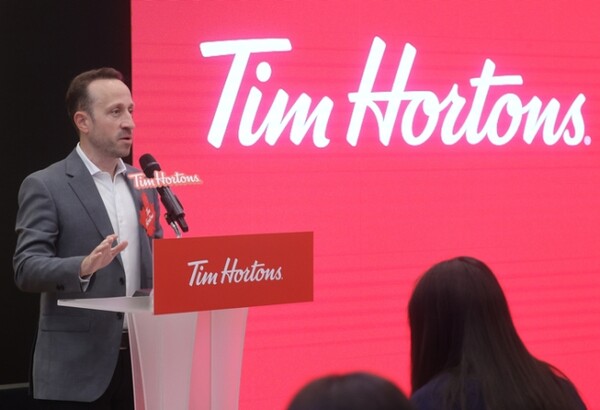[ad_1]

On Dec. 12, Canada’s renowned coffee brand, Tim Hortons, held a media event at its first domestic location, the Sinnonhyeon Station branch in the Gangnam district of Seoul. During the event, the company unveiled the reasons behind its entry into the South Korean market and discussed its strategies for brand differentiation.
Tim Hortons is widely recognized as a “national brand” in Canada, boasting over 3,500 stores. In that local market, its strength lies in offering coffee and donuts at reasonable prices, establishing itself as a prominent player in the industry.
As part of the RBI group, along with Burger King and Popeyes, Tim Hortons operates around 5,700 stores in 17 countries. South Korea marks its seventh entry into the Asian market, following the Philippines, China, Thailand, Pakistan, India, and Singapore. In South Korea, the operation is managed by BKR, the operating company for Burger King Korea.
The pricing for medium-sized beverages is set at 3,900 won (US$2.96) for brewed coffee, 4,000 won for an Americano, and 4,600 won for a cafe latte. The signature menu item, the Original Ice Cap, a coffee slush, is priced at 5,100 won, while the warm sandwich Maple Cheese Melt can be enjoyed for 6,200 won. It’s worth noting that the Americano is relatively more expensive compared to local Canadian prices, which typically hover around 2,490 won.
The challenge lies in the fact that the domestic market is already saturated with coffee specialty shops, with Starbucks wielding considerable influence. With annual sales exceeding 2 trillion won between 2021 and 2022, Starbucks maintains an undisputed dominance, backed by a substantial network of 1,870 stores across the nation. In terms of the number of outlets, Ediya Coffee takes the lead with over 3,000 outlets. However, it faces significant competition from budget coffee brands such as Mega Coffee.
After Blue Bottle Coffee made its debut in South Korea in 2019, the upcoming entry of Intelligentsia Coffee, recognized as one of the top three coffee brands in the United States, is expected to further intensify competition in the domestic market.
Tim Hortons, set to open its second branch near Seolleung Station in Seoul on Dec. 28, has ambitious plans to open over 150 additional stores within the next five years.
[ad_2]
Source link
